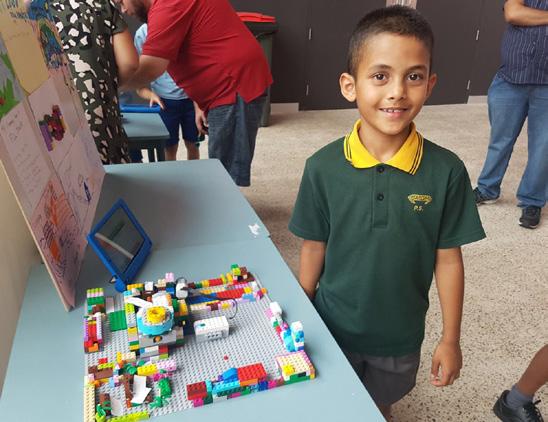
15 minute read
Every little drop
from 2017-12 Sydney (2)
by Indian Link
BY SONDARYA KRISHNAN
We all know that it rains from the sky and clean water is directed into the drainage system. But, can you explain how and where rain water is filtered and redirected back to our kitchen taps and bathroom showers?
If you feel unsure, perhaps a six-yearold could explain it to you. Many students aged 6-10 recently researched the journey of a water drop from dam to home and then presented a project on it.
The whole exercise was part of the FIRST ® LEGO ® League Jr (FLL Jr). FIRST® Robotics is an internationally acclaimed robotics program that inspires a passion for Science, Technology, Engineering and Maths in young people. Founded in the USA in 1989, FIRST® Australia was established at Macquarie University in 2006. Each August, a new real world inspired theme is published for students to explore and research. The theme this year is Water. Students from four schools - Parramatta East Public, Girraween Public, Metella Road Public and Oatlands Public - participated in the program. Chintan Shah of the Australian Academy of Robotics And STEM
Education, mentored students from the schools.
While FIRST® LEGO® League teams conduct research projects and design autonomous robots specifically to carry out missions relating to the topic, FIRST® LEGO® League Jr. teams conduct much smaller projects and makes models out of LEGO® elements to illustrate one part of the theme.
As part of the competition, students had to research the journey of a water drop, choose a problem related to water’s lifecycle and come up with ideas to solve that problem. Some of the challenges identified by this year’s teams are harvesting rainwater and water filtration. MP Julie Owens attended this year’s exhibition at Macquarie University on 2 December and showed her support through further encouraging students to learn STEM concepts.
“The next generation of professionals will be humanitarian engineers that will use technology to solve complex social, economic and political issues facing mankind. Programs such as FLL Jr are a great way to inspire young kids to follow this path,” Shah said.
To aid their research, the students and their parents went to Warragamba Dam in Western Sydney.
This field trip inspired team Water Bendors - comprising Kieran Hughes, Abdullah Farooq and Jude Khazaleh - to look at the way rainwater was wasted.
The solution that they found was to have a roboticised rain water harvesting system. They built a model out of LEGO® blocks and created a water tank that leads to a processing factory. Once the water is processed, it is suitable for drinking purposes. In their model, the Water Bendors created a factory door which was fully automated. Abdullah said, “The main lesson I learnt was to never waste water. I found out that my daily habits, even brushing teeth, logic and LEGO® building skills. “I felt my creativity improved as a result of this experience,” he said.
Interestingly, although parents attended the field trip with the students, they consciously played a small role in the development of the solution and the LEGO® model. Students were encouraged to work as a team and learnt from asking questions of one another. None of the teams had a student leader and instead the changed because of this program.”
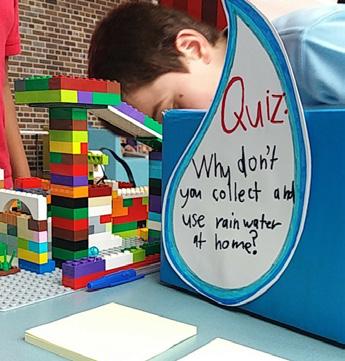
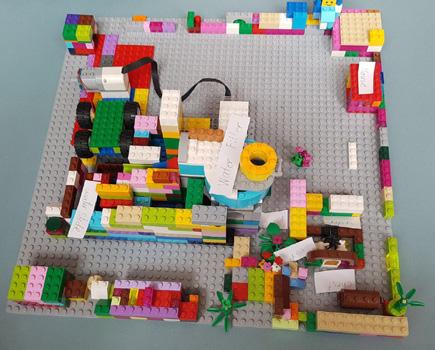
Team Aqua Rangers featuring Akileish Ramesh, Amirthan Thiruarrenkan, Ansh Nayak, Liam Lai, Manuth Rupasinghe, and Sanvi Shah focused on the filtration aspect of water processing. They researched how water is captured, filtered and processed to be used in homes. Their model had six key stages of screening, fanning, filtration, chemical processing, reservoir storage and pumping to homes. Akileish said that he and his team were able to devise this rather insightful solution through their focus was on delegating tasks fairly.
Shah, who acted as the head mentor, said, “It gives me a great sense of satisfaction when I see kids becoming more confident in expressing themselves to others, negotiating ideas and taking responsibility for their work. This is a tool that develops in children the abilities of problem-solving, dealing with failures and collaboration.”
Besides, the students also present a speech about the project - which they write themselves - giving them confidence while public-speaking as well.
Five years after Nirbhaya, is Delhi any safer for women?
Five years after 23-year-old Nirbhaya was brutally raped and murdered by five men on December 16, earning Delhi an epithet of “rape capital” of India, has the national capital become any safer for women? Crime data doesn’t suggest so and females who live and work in the city and its peripheries also don’t feel safer despite resolves by the centre and city governments to enhance women’s safety.
According to National Crime Records Bureau (NCRB) data for 2016-17, Delhi reported the highest crime rate (160.4) compared to the national average rate of 55.2. The capital reported nearly 40 per cent of rape cases (2,155 cases of rape, 669 cases of stalking and 41 cases of voyeurism) during the period.
IANS spoke to a few women, coming from different professional background about how safe they feel in the city.
Sumitra Girotra, a Haryana girl who works in Noida but lives in a hostel in Delhi, feels “palpably unsafe even in the socalled posh areas of the city.”
“It may be strange to read about women getting molested in the broad daylight but it is certainly not strange to be verbally molested or to get rape threats while walking down the roads in Delhi. I have been a victim many times,” Girotra said, recalling an incident when she asked a drunk man to stop staring at her near Mandi House, a few steps away from her hostel. It was 8.30 p.m.
“He was peeing and staring at me. When I objected, he turned towards me with his zip down and started abusing me with rape threats. I gave it back to him and tried fighting back, dragged him to the hostel and called the guard for help. He refused, saying it is dangerous to fight them. I called up the police but by the time they came, the guy had disappeared.
“Instead of looking for the guy, the police asked me to register a case, give my name and other credentials. I mean it gets more frustrating and worse after you suffer.
“The mindset is certainly universal but the situation here in Delhi is just too bad. I have travelled to other parts of the country...but never felt so unsafe.”
Utkarsha Dixit, a 24-year-old Gurgaon based designer, said it was “indeed scary” for a woman to remain outside home after 9 pm, even if it is a public space.
“You never know which men standing next to you and looking at you can be a potential molester. And taking an auto or travelling in a cab is now even more of a nightmare. I personally never feel safe without my pepper spray, at least it’s an immediate option to protect myself. I cannot depend on police as most of the time their helpline number doesn’t work,” Dixit said.
Sukanya Ghosh, 28, an art designer at an advertising firm, echoed the apprehensions. She noted that strange fear of travelling alone is palpable even during the day time.
“I cannot even imagine of going out at night with only girls. I always prefer male friends to accompany me, just for the sake of safety.
“Even travelling in the general coaches in metro has often turned into a nightmare with terrifying incidents of being physically molested. So, I really don’t know where I can claim to be in the safe zone,” Ghosh noted.
Neha Nar, a medical practitioner from Mumbai who came to Delhi three years ago, said ironically it is a woman and her attire that is often blamed for her ordeal and that makes it worse.
“Questions have always been raised on dress code for a woman. I have been a victim of molestation even after wearing a so-called decent dress. A molester will anyway harass a woman no matter what she wears. But yes, now I have become conscious of what to wear,” she said.
Tiasha Dutta Gupta, a PR professional who shifted to the national capital five years ago, shared her experience of living in Delhi.
“After Nirbhaya incident, we had regained our faith that things will change. But little has happened. Police still have a laid back attitude, women are not comfortable to lodge a complaint, I still feel shivers down my spine when at late nights a car passes by or comes close to me when I am standing alone.
“I still panic when the cabbie takes the lonely dark road. And, I can assure it’s not just me, but any other girl in the city would resonate,” she said.
Challenges for Rahul: Revamping party set-up, electoral battles before 2019 polls
Rahul Gandhi’s long-delayed elevation as Congress party chief is almost over as he was on 11 December elected Congress President at a time when the party is facing an “existential crisis.” His main challenge remains the revamping of party organisation, apart from electoral battles in the run-up to the 2019 Lok Sabha polls.
Gandhi took over the reins of the grand old party just a few days before the 18 December counting of votes for Gujarat and Himachal Pradesh assembly elections, the outcome of which could be a trendsetter ahead of the 2019 Lok Sabha election.
Gandhi, 47, who took over from his mother Sonia Gandhi who had helmed the country’s oldest party for 19 long years, will be the sixth member of the Nehru-Gandhi family to take the top position of the 132-year-old party.
The outcome of the Gujarat polls would be interpreted in terms of Rahul Gandhi’s ability as a “campaigner and vote-getter”.
The next round of assembly polls in 2018 - first in Karnataka and later in Madhya Pradesh, Rajasthan and Chhattisgarh - will be crucial for Gandhi in order to build the momentum to take on Prime Minister Narendra Modi in the Lok Sabha polls.
The state elections, with Bharatiya Janata Party as the key rival, will also be the first major polls directly under Rahul Gandhi’s charge as party chief. Assembly polls will also be held early next year in Meghalaya, Nagaland and Tripura.
The challenges for Rahul Gandhi include infusing fresh energy and life in Congress workers and evolving a proper strategy to
Women shop for festive hats ahead of Christmas at a market in Mumbai. Though Christians make up only about 2 per cent of India’s 1 billionplus population, Christmas is a national holiday celebrated with much fanfare. Photo: AP galvanise the party, following a string of electoral losses since the 2014 Lok Sabha debacle.
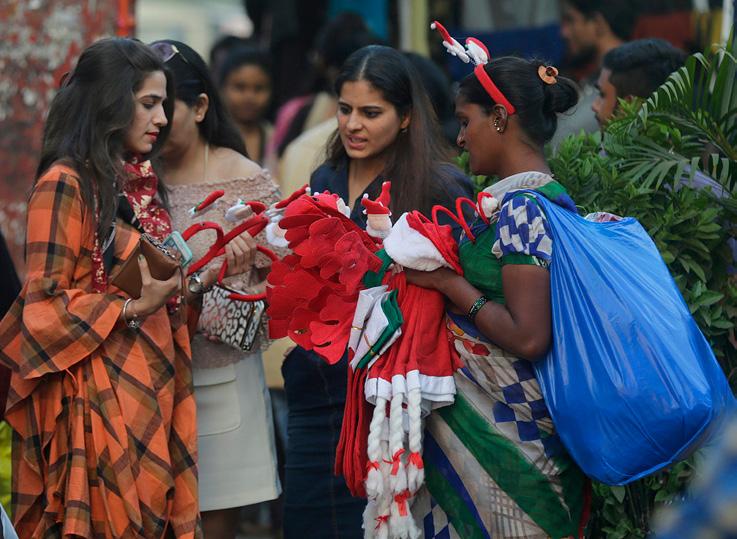
Gandhi has to be decisive on forging a larger opposition alliance for the 2019 Lok Sabha polls under a “collective leadership” or even projecting himself as the alternative to Modi with the support of different parties.
Gandhi has always been perceived as a reluctant politician due to some of his longish trips abroad, which delayed his stepping into the role of party chief.
His action not to take up ministerial responsibility in two UPA governments and not properly following through some of the issues he raised drew strong criticism.
He has been able to counter those perceptions to some extent with his sharp and aggressive attacks on Modi and the BJP. His recent trip to the United States, where he held interactions with think tanks, has brought about a sea change to his overall image.
In Gujarat, where success will be a big morale-booster for the Congress, Gandhi has sought to create a broad social coalition and has forced Modi to react.
Reviving the Congress in Uttar Pradesh is going to be another major challenge for Rahul Gandhi - the state that sends the largest contingent of 80 members to the Lok Sabha.
The results of the local body polls in Amethi and Rae Bareli, the Lok Sabha constituencies of Rahul Gandhi and Sonia Gandhi respectively, have not given a fillip to Rahul Gandhi’s image.
Rahul Gandhi had been projected as a young leader who understands the language and pulse of the youth but Modi has been more successful in weaning away the section that has large electoral presence. The Congress also has to devise ways to woo the large middle class.
He needs to act smartly in his dealings with allies and other opposition parties, including the Communist Party of IndiaMarxist.
Within the party, Gandhi has to take several decisions, including whether to project chief ministerial candidates in pollbound Madhya Pradesh, Chhattisgarh and Rajasthan and who they are going to be.
To bring about unity in faction-ridden state units and striking the right the balance between the “old guard” and the younger aspirants will be his other challenges.
The Congress is ruling now in five states and a union territory only and a loss in Gujarat as well as in Karnataka next year will further put a squeeze on its chances of staging a comeback at the Centre in 2019.
Gandhi, who is into his third term as Lok Sabha MP, was made Congress Vice President in 2013 as a stepping stone to his eventual elevation to the top party post.
Since 2004, Rahul Gandhi has been the Lok Sabha member from Amethi in Uttar Pradesh. In 2007, he was named Congress General Secretary in charge of youth and student wings of the party.
India’s captain Rohit Sharma celebrates after scoring a double century during the second one-day international cricket match against Sri Lanka in Mohali, on 13 Dec. Sharma became the only cricketer to score three double centuries in ODIs.
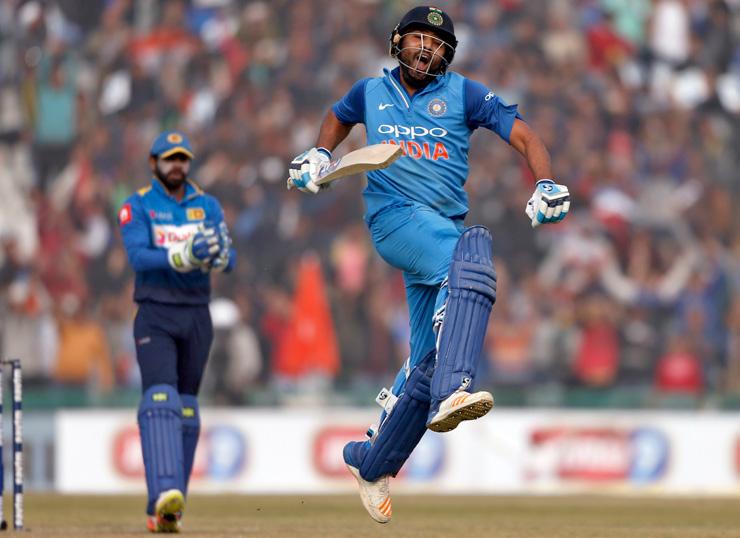
He has attended St Stephen’s College, Delhi, Harvard College and Rollins College, Florida, from where he graduated with a Bachelors in Arts.
He received an M. Phil in Development Studies from Trinity College, Cambridge University. Thereafter, he joined the Monitor Group, a strategy consulting group, in London, where he worked for three years.
PM commissions India’s 1st indigenously-built Scorpene submarine
Heralding it as a significant new era to boost India’s defence and security, Prime Minister Narendra Modi on 14 December commissioned the country’s first indigenously-built Scorpene-class submarine INS Kalvari into the Indian Navy.
It is named after the first Foxtort-class submarine - INS Kalvari - which was inducted into the Navy on December 8, 1967. This indigenous version comes days after the golden jubilee of the Navy’s submarine wing.
This is the first conventional submarine to be inducted into the Indian Navy. Kalvari means Tiger Shark.
Modi thanked France for its help and collaboration in developing the Scorpene submarines, which encompass superior stealth and combat capabilities.
“It signifies strengthening of the growing strategic ties between India and France,” Modi said.
The Scorpenes were being built by the Mazagaon Dockyard Ltd (MDL) here under Project 75 with transfer of technology from a foreign collaborator - DCNS of France.
He said the INS Kalvari will provide a significant boost and synergise the country’s defence, economic, technical and international powers, along with people power on the global arena.
It will play a crucial role in India’s security and regional stability, he added.
Modi said India was fully alert with regard to its global, strategic and economic interests in the Indian Ocean.
“India’s humanitarian commitment to national security and diplomacy makes us stand apart in the world. So, a safe and secure India is good not just for this country but for entire humanity.”
He said India was playing a crucial role in confronting “all challenges emanating from the high seas, be it terrorism, piracy, narcotics smuggling or illegal fishing” for the countries in the Indian Ocean rim.
INS Kalvari is manned by a team comprising of eight officers and 35 sailors with Captain S D Mehendale at the helm.
The second in the series of six submarines in this project, INS Khanderi is currently undergoing sea trials and all the submarines are due to be inducted gradually into the Indian Navy by 2020.
The state-of-the-art features of the Scorpenes include superior stealth and ability to launch crippling attacks with precision-guided weapons.
The attacks can be carried out with torpedoes both while submerged or on the surface - in all war theatres including the tropics, giving it an unmatched invulnerability.
The submarine has an overall length of 67.5 metre and a height of about 12.3 metres. The hull form, fin and hydroplanes are specifically designed to produce minimum underwater resistance.
Home Ministry to set up panel for assessing Ockhi damage
The Union Home Ministry is constituting an inter-ministerial central committee for the spot assessment of damage and admissibility of claims of the states hit by Cyclone Ockhi, an official said.
The committee will visit the spot and submit a detailed report to the Ministry within certain period about the loss of property caused by Ockhi that hit Tamil Nadu and Kerala on November 30.
The Home Ministry official said that Tamil Nadu and Kerala were in the process of preparing memorandum of seeking central assistance.
Kerala Chief Minister Pinarayi Vijayan said on 13 Dec that his government has sought Rs 1,843 crore from the Central government to mitigate the damage caused by Cyclone Ockhi. Kerala has also demanded Rs 300 crore for immediate relief.
Cyclone Ockhi, which in Bengali means ‘eye’, went on make landfall in Lakshadweep on December 2 and caused extensive damages to houses, power lines and other infrastructure in the islands and coastal areas of Tamil Nadu and Kerala.
It dissipated near the south coast of Gujarat on December 6.
The Home Ministry official said that thousands of houses and large areas of standing crops were damaged due to the cyclone.
He also said over 2,391 people from Tamil Nadu and 8,566 from Kerala had been evacuated far while over 600 fishermen of both the states are still missing after the cyclone rampaged through parts of south and western India.
As of now, 63 people have lost their lives in Kerala and 14 in Tamil Nadu during the cyclone.
In historic first, Sikh nominated to be attorney general of New Jersey
In a historic first, a distinguished Sikh public prosecutor “who has experienced hate and intolerance first-hand” has been nominated to be the next attorney general of the US state of New Jersey.
If Gurbir S Grewal’s nomination by Democrat Governor-elect Phil Murphy is approved by the State Senate early next year, he will be the first Sikh to assume the top state law enforcement position in the United States and the second IndianAmerican, after Kamala Harris, who held the position in California before her election to the US Senate.
Announcing the nomination in the state capital, Trenton, on Tuesday, Murphy said, “In light of all that is being thrown at us by the president, we need an attorney general unafraid to join our fellow states in using the law to protect all New Jersey residents.”
Grewal, 44, is the prosecutor of Bergen County, an important district across the river from New York. He was appointed by the current Republican Governor Chris Christie and that is likely to mute any opposition the senate.
Symbolic of the public acceptance of minorities despite scattered incidents of bigotry, two Sikhs were elected mayors last month, Ravi Bhalla in Hoboken, New Jersey, and Preet Didbal in Yuba City, California.
Vin Gopal, who became the first IndianAmerican to be elected to the New Jersey State Senate last month, said that Grewal is someone “not only eminently qualified, but who will bring a perspective to the office that is diverse and long-overdue.”
After Murphy made the announcement, Grewal said, “I wanted to give back to a country that has given us and other immigrant families like us so much.”
Turning to his three daughters, Kyrpa, Mayher and Mahek, who were with him, he said, “As someone who has experienced hate and intolerance first-hand throughout my life, I wanted to work to ensure we all live in and that the three of you grow up in a fair and just society.”
Grewal added, “I wanted to perhaps also show people that while I and others like me may look different or worship differently, that we, too, are committed to this country.”
Hailing Grewal’s nomination, Rajwant Singh, the co-founder of the National Sikh Campaign, said, “These are exactly the kind of role models our youngsters need to feel proud of being a Sikh and an American.”
“While America could be seen having a very polarized situation politically and yet there are some very shining moments to show that people of all backgrounds can aspire for top positions,” he added.
South Asian Bar Association President Rishi Bagga, said, “The decision to appoint a visible minority as the chief law enforcement officer for New Jersey reflects the diversity of the state and of the US, and is especially important in a time where minorities and immigrants have often felt targeted by law enforcement.”
Attorney General is a very powerful position New Jersey heading the Department of Law and Public Safety, which includes the state police.
Grewal has earlier served as an assistant federal prosecutor in New York and in New Jersey, where he was also the chief of the Economic Crimes Unit.
In the administration of former President Barack Obama, Indian Americans have held senior law positions. Neal Kumar Katyal was an Acting Solicitor General.
Sri Srinivasan, now a federal appeals court judge in Washington, did a stint as the Principal Deputy Solicitor General.
Vanita Gupta was the Principal Deputy Assistant Attorney General and headed the Justice Department’s Civil Rights Division.
US President Donald Trump has appointed Uttam Dhillon to be his special assistant and associate counsel.
IANS









